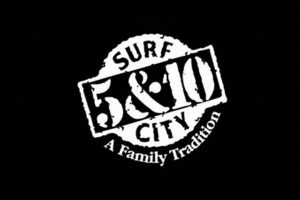A business providing supplies and equipment for recreational saltwater angling located in a specific coastal community in New Jersey. Such an establishment typically offers items like fishing rods, reels, line, hooks, bait (live, frozen, or artificial), tackle boxes, and related accessories. These businesses serve both local residents and visiting tourists who participate in surf fishing, bay fishing, or offshore fishing activities.
These entities are vital for the local economy, supporting tourism and recreational fishing. They provide essential resources for anglers to enjoy their sport, contribute to the community’s identity, and often serve as sources of local fishing knowledge and advice. Many have been in operation for years, developing strong ties with the local fishing community and playing a role in preserving angling traditions.
The availability of these resources shapes the accessibility and success of recreational fishing within a region, offering various benefits to anglers and the local economy. It also offers specific fishing gear, expert tips, and a deep connection to the local waters and fishing traditions. The article will now delve into more specific facets of recreational fishing in the area, including seasonal opportunities and prevalent techniques.
Essential Angling Advice
Maximize your fishing success in the coastal New Jersey area with these curated recommendations. Success relies on the right approach, equipment, and knowledge of the local environment.
Tip 1: Optimal Bait Selection: Choose bait based on target species and season. Clams and sandworms prove effective for striped bass, while squid appeals to fluke. Seasonal shifts affect bait availability and fish preference, so adjust accordingly.
Tip 2: Rigging for Success: Employ appropriate rigs for prevailing conditions. A fish-finder rig with a circle hook can improve hookup rates for striped bass, whereas a fluke rig with a bucktail jig attracts fluke in the bay.
Tip 3: Understanding Tides and Currents: Fish activity frequently correlates with tidal movements. Incoming tides often bring baitfish closer to shore, attracting predatory species. Learn to recognize the influence of tides on current direction and strength.
Tip 4: Selecting the Right Tackle: Matching tackle to the target species and environment proves essential. A medium-heavy rod and reel combination handles striped bass, while a lighter setup suits fluke fishing in calmer waters.
Tip 5: Mastering Casting Techniques: Develop proficiency in casting. A proper cast will get your bait beyond the breaking waves where bigger fish can often be found.
Tip 6: Reading the Beach: Identify structure, such as sandbars and sloughs, which attract fish. Understanding the beach profile helps locate potential feeding areas.
Tip 7: Respecting Local Regulations: Adhere to size and bag limits, as well as any specific area restrictions. Awareness and compliance with regulations contribute to sustainable fishing practices.
The provided advice serves as a foundation for enhanced fishing experiences. Applying these insights increases the likelihood of success and promotes responsible angling.
These essential tips will help anglers have a more profitable fishing adventure. The following section provides a comprehensive look at seasonal fishing in the area.
1. Local Angling Resource
A fishing supply business serves as a crucial local resource for the angling community. This business provides tangible supplies like rods, reels, bait, and tackle, enabling fishing activities. Moreover, it offers an intangible resource: local knowledge. Employees often possess years of experience fishing in the area and can advise on effective techniques, productive locations, and seasonal patterns. Its presence impacts the success and enjoyment of local anglers, contributing to the recreational value of the area.
Such establishments frequently support local fishing tournaments and events, strengthening their connection to the community. Owners and employees often participate in conservation efforts, promoting responsible fishing practices. They also function as information hubs, alerting anglers to changing conditions like algal blooms or unusual fish migrations. This multifaceted role extends its influence beyond simple retail operations. For example, if a dangerous jellyfish bloom appears, the store can warn customers. This practical service is highly beneficial for both tourism and the local community.
The availability of a robust fishing supply store enhances the local fishing experience. It also is vital for the area’s tourism and overall economic health. Its role extends beyond retail, providing essential information and support for both novice and experienced anglers. Understanding this relationship demonstrates the interconnectedness of recreational fishing, local businesses, and the community.
2. Specialized Fishing Gear
The availability of specialized fishing gear defines the operational effectiveness of a fishing supply business. Tailored equipment directly influences the success and enjoyment of angling activities within the local environment. This gear must align with the predominant species, fishing conditions, and techniques utilized in the region.
- Rod and Reel Combinations for Surf Fishing
Surf fishing requires rods designed to cast long distances from the shoreline. These rods, typically 9 to 12 feet in length, need to withstand the corrosive saltwater environment. Paired reels should offer high line capacity and retrieve rates to handle larger fish and strong currents. A local business stocking such specialized combinations provides anglers with the tools necessary for effectively targeting species like striped bass, bluefish, and weakfish from the beach.
- Terminal Tackle for Specific Species
Terminal tackle refers to the components at the end of the fishing line: hooks, swivels, sinkers, and leaders. Different species demand specific terminal tackle configurations. Fluke fishing, for instance, benefits from fluke rigs incorporating bright attractors and tandem hooks. Striped bass fishing often uses fish-finder rigs with circle hooks to increase hookup ratios. Supplying a range of species-specific terminal tackle enhances the angler’s ability to target diverse fish populations effectively.
- Waders and Protective Clothing
Surf fishing often involves wading into the water to reach optimal casting positions or to navigate tidal changes. Waterproof waders protect anglers from cold water and spray, maintaining comfort during extended fishing sessions. Other protective clothing, such as waterproof jackets and gloves, further enhances comfort and safety in inclement weather. A store that provides these items ensures that anglers can endure diverse environmental conditions.
- Specialized Baits and Lures
Successful fishing relies heavily on presenting the right bait or lure. Depending on the target species and time of year, artificial lures such as bucktails, swimbaits, and plugs can prove effective. Live or frozen baits, including clams, sandworms, and bunker, also play a crucial role. A store supplying an array of species-specific baits and lures maximizes the angler’s chances of attracting and hooking fish. Local knowledge plays a vital role in determining which baits are most effective in any given season.
The provision of specialized fishing gear by a local business directly impacts the angling experience. By offering equipment tailored to the region’s species and conditions, the business supports both recreational and economic aspects of fishing. Anglers equipped with the proper tools are more likely to experience success, contributing to their enjoyment and potentially increasing their participation in fishing activities.
3. Bait Availability
The capacity of a fishing supply business to provide a consistent and diverse range of bait significantly shapes its standing and utility for anglers. Bait availability encompasses several facets, ranging from sourcing and storage to selection and seasonal adjustments. These elements collectively determine the effectiveness of the business as a resource for both local and visiting anglers.
- Live Bait Sourcing and Maintenance
The procurement of live bait, such as sandworms, bloodworms, and killifish, presents logistical challenges. These organisms require controlled environments to maintain viability. Live bait suppliers must maintain aerated tanks, regulate water temperature, and manage waste to ensure that bait remains attractive to fish. Its ability to consistently offer healthy live bait reflects its commitment to serving the needs of serious anglers and the overall fishing community.
- Frozen Bait Variety and Quality
Frozen bait represents a more accessible and shelf-stable alternative to live options. Common frozen baits include squid, bunker, clams, and shrimp. A well-stocked business will offer a variety of frozen bait options to cater to different species and fishing techniques. Proper freezing and storage practices are crucial to prevent freezer burn and maintain the bait’s effectiveness. Failure to provide a variety of fresh-looking frozen bait will be seen as a sign of a business not performing regular maintenance.
- Artificial Lure Selection
Artificial lures provide a reusable and versatile alternative to natural baits. A fishing supply business catering to local anglers should offer a range of lures that imitate local baitfish and attract target species. Bucktails, swimbaits, crankbaits, and plugs are examples of lures commonly used in saltwater fishing. The availability of specialized lures, such as those designed for specific depths or currents, adds value for anglers seeking to optimize their fishing strategies. The selection and availability of artificial lure affects a shop’s performance.
- Seasonal Bait Adjustments
Bait preferences of fish change throughout the year in response to water temperature, spawning cycles, and prey availability. A fishing supply business catering to local anglers should adjust its bait inventory to reflect these seasonal shifts. For example, bunker might be prevalent during summer months when striped bass are actively feeding, whereas clams could be more effective during colder months. Bait availability can increase or decrease based on the time of year and season.
The consistent availability of suitable bait, whether live, frozen, or artificial, forms a cornerstone of its identity and service to the angling community. This is key for a business that offers service to the many visitors of the town and the residence. Effective bait management, informed by local knowledge and seasonal awareness, enhances the fishing experiences for its customers and supports the local economy. This not only enhances the business but also ensures a vibrant fishing community.
4. Community Hub
A coastal fishing supply business frequently serves as a central location for anglers, evolving into a community hub. This role transcends simple retail transactions, fostering interactions and knowledge sharing among local and visiting fishing enthusiasts.
- Information Exchange
Such establishments facilitate the exchange of crucial, real-time information. Anglers often share recent fishing reports, detailing productive locations, effective bait, and prevalent conditions. Store personnel, with their accumulated local knowledge, contribute to this exchange. This collective intelligence benefits both seasoned and novice anglers, increasing their chances of success. For instance, a sudden influx of bluefish could be rapidly communicated within the store, allowing anglers to adapt their tactics accordingly.
- Social Interaction
The physical space promotes social interaction among anglers. Regular customers often develop camaraderie, sharing stories, tips, and experiences. The business might host informal gatherings or workshops, further strengthening these bonds. These social connections create a sense of community, enhancing the overall fishing experience beyond the act of angling itself. Many life-long fishing friends start their relationships around a fishing shop.
- Local Event Support
Businesses frequently support local fishing tournaments, derbies, and conservation initiatives. Sponsorship of events, providing prizes, or organizing volunteer efforts contributes to the community’s identity. This active engagement deepens its connection to the area and demonstrates a commitment beyond commercial interests. Fishing shops usually provide fishing supplies to charities that work to help children and under-privileged kids have a better life. Supporting these kinds of causes makes a fishing shop a cornerstone of the community.
- Mentorship and Education
Experienced anglers often mentor newcomers, providing guidance on techniques, equipment, and responsible fishing practices. Store personnel may offer informal lessons or workshops, educating anglers on topics ranging from knot tying to species identification. This educational role contributes to the sustainability of the sport by promoting ethical behavior and ecological awareness. Experienced employees usually pass down generations of knowledge from the shop.
By serving as a nexus for information, social interaction, event support, and education, the fishing supply business strengthens the local angling community. This multifaceted role extends its impact beyond simple retail transactions, embedding the business within the social fabric of the coastal town and ensuring its long-term relevance.
5. Seasonal Expertise
Seasonal expertise constitutes a critical component of a fishing supply business located in a coastal New Jersey community. This expertise involves an in-depth understanding of the seasonal variations in fish behavior, migration patterns, and preferred habitats within the local waters. The business’s ability to provide accurate and timely information directly impacts angler success rates and overall satisfaction. For instance, knowing when striped bass migrate into the area’s waters in the spring or when fluke fishing peaks during the summer months demonstrates this knowledge. This seasonal awareness guides product stocking, advice to customers, and the overall operational strategy of the business. If a shop offers the wrong products at the wrong time, then the potential profit will be severely limited.
The practical application of seasonal expertise manifests in various ways. The business can adjust its inventory to stock baits, lures, and tackle appropriate for the species currently active. Employees can offer informed recommendations on the most effective techniques for targeting specific fish during different times of the year. The business might also host workshops or seminars focusing on seasonal fishing strategies. A store that actively monitors water temperatures, tidal patterns, and local fish reports displays a commitment to seasonal expertise. Providing customers with up-to-date fishing reports and suggesting effective bait for each season shows how a business’s knowledge can boost its customers’ chances of success. By offering this level of guidance, the business positions itself as a trusted resource and enhances the overall fishing experience for its clientele.
In summary, seasonal expertise represents a vital asset for a fishing supply business. The ability to accurately interpret and apply knowledge of seasonal fishing patterns translates to improved customer satisfaction, enhanced business reputation, and a stronger connection to the local angling community. Challenges in maintaining this expertise might include keeping abreast of rapidly changing environmental conditions or accurately predicting fish migration patterns. However, investing in ongoing education, monitoring local resources, and actively engaging with anglers will allow a business to effectively leverage seasonal expertise for sustained success.
Frequently Asked Questions
The following addresses common inquiries pertaining to a fishing supply business operating in a coastal New Jersey community. These questions and answers aim to provide clarity and address potential areas of concern for anglers and potential customers.
Question 1: Does the business offer fishing licenses?
Licensing requirements vary by state. It is advisable to directly contact the establishment to determine if they act as an authorized vendor for New Jersey fishing licenses. Alternatively, information regarding licensing can be obtained from the New Jersey Department of Environmental Protection, Division of Fish and Wildlife.
Question 2: What types of bait are typically stocked?
Bait selection depends on seasonal availability and target species. A representative assortment may include live sandworms and bloodworms, frozen clams and squid, as well as artificial lures such as bucktails and swimbaits. It is recommended to inquire about current stock and recent fishing reports to optimize bait selection.
Question 3: Are rod and reel repair services available?
The availability of repair services varies. Inquire about on-site repair capabilities or if the business partners with a local repair technician. Preventative maintenance, such as rinsing equipment with fresh water after each use, extends the lifespan of fishing gear.
Question 4: Does the business provide fishing charters or guide services?
Fishing charters and guide services are typically operated independently. The business might maintain a list of local charter captains or guides for referral purposes. Alternatively, online directories and local tourism resources can provide information on charter options.
Question 5: What are the business’s hours of operation?
Hours of operation are subject to change based on season and local demand. Contact the business directly for current hours or consult online listings. Seasonal adjustments may affect hours during peak fishing seasons or inclement weather.
Question 6: Does the business offer online ordering or shipping?
The availability of online ordering and shipping is subject to the business’s infrastructure and operational capabilities. Contact the business directly to inquire about online sales or shipping options. Local delivery may be available within a limited radius.
This FAQ addresses common questions regarding the operation of a fishing supply business. For specific inquiries, direct communication with the business is recommended.
The following section will summarize the key aspects of successful fishing experience.
Conclusion
The examination of “surf city bait and tackle surf city nj” reveals its integral role in supporting the local angling community and economy. The business serves as a resource for equipment, expertise, and community engagement. Its success relies on adapting to seasonal variations, providing specialized gear, and fostering connections among anglers.
The enduring relevance of businesses like this depends on their ability to evolve with the changing needs of anglers and the dynamic coastal environment. Sustained commitment to quality products, informed service, and community involvement will ensure their continued contribution to the fishing culture. The future viability of the shop is related to the success of the local angling community.







